Tourism and Environmental Sustainability: A Developing World View
VerifiedAdded on 2022/12/27
|11
|2699
|1
Report
AI Summary
This report critically examines the environmental unsustainability of tourism, particularly in developing countries. It argues that tourism leads to the exploitation of scarce resources like water and energy, negatively impacts the quality of life for local communities by limiting their access to essential resources, contributes significantly to environmental pollution through waste generation and resource depletion, and negatively affects food resource consumption. The report highlights the detrimental effects of tourist activities, such as littering and excessive resource usage, leading to habitat degradation and reduced living standards for local populations. The report concludes by recommending government interventions, such as imposing strict penalties on littering and encouraging travel agencies to minimize resource consumption, to mitigate tourism's adverse environmental impacts and promote sustainability. The report emphasizes the need for a balanced approach that considers both the economic benefits and environmental consequences of tourism in developing countries, advocating for policies that protect natural resources and improve the quality of life for local communities.
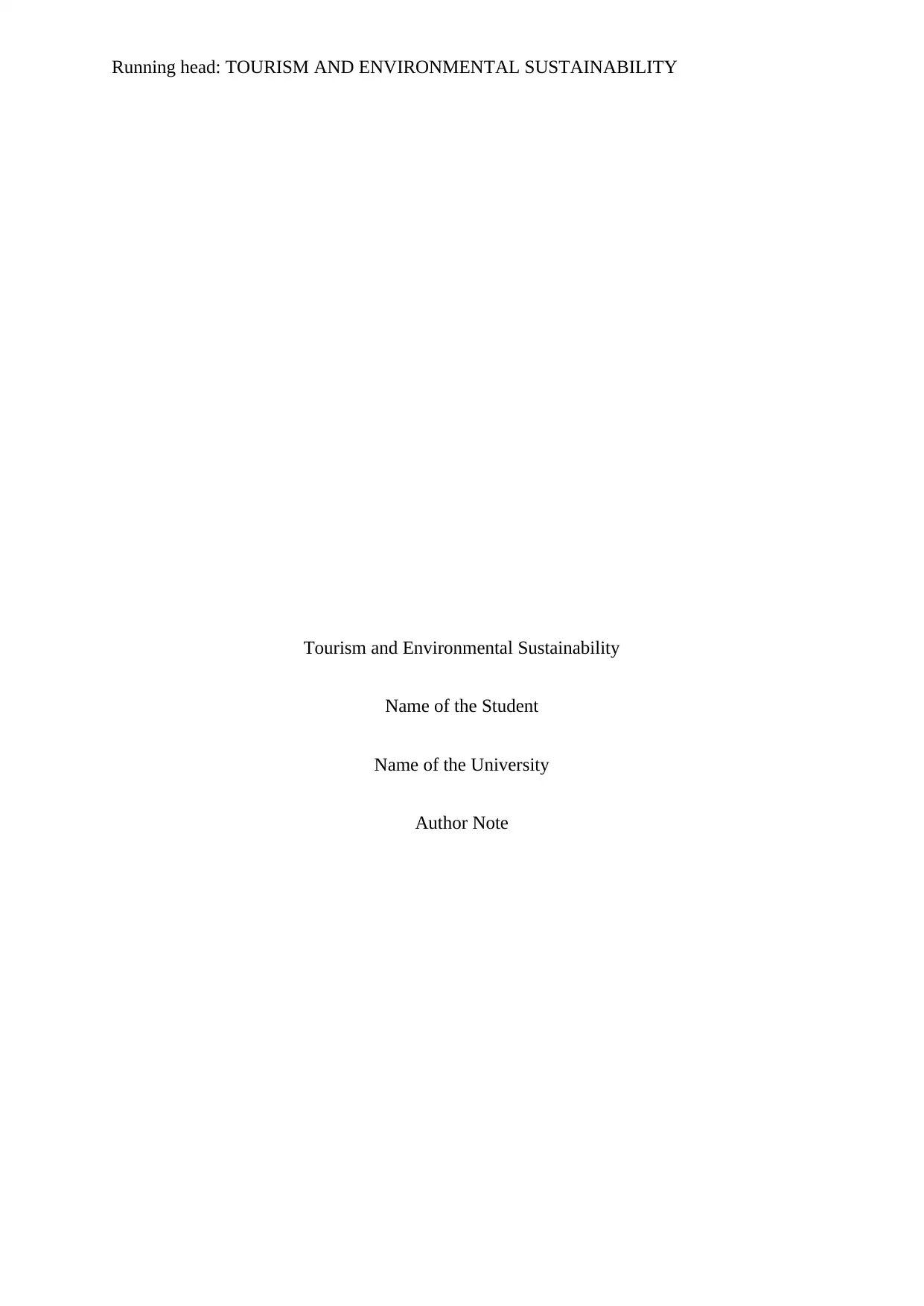
Running head: TOURISM AND ENVIRONMENTAL SUSTAINABILITY
Tourism and Environmental Sustainability
Name of the Student
Name of the University
Author Note
Tourism and Environmental Sustainability
Name of the Student
Name of the University
Author Note
Paraphrase This Document
Need a fresh take? Get an instant paraphrase of this document with our AI Paraphraser
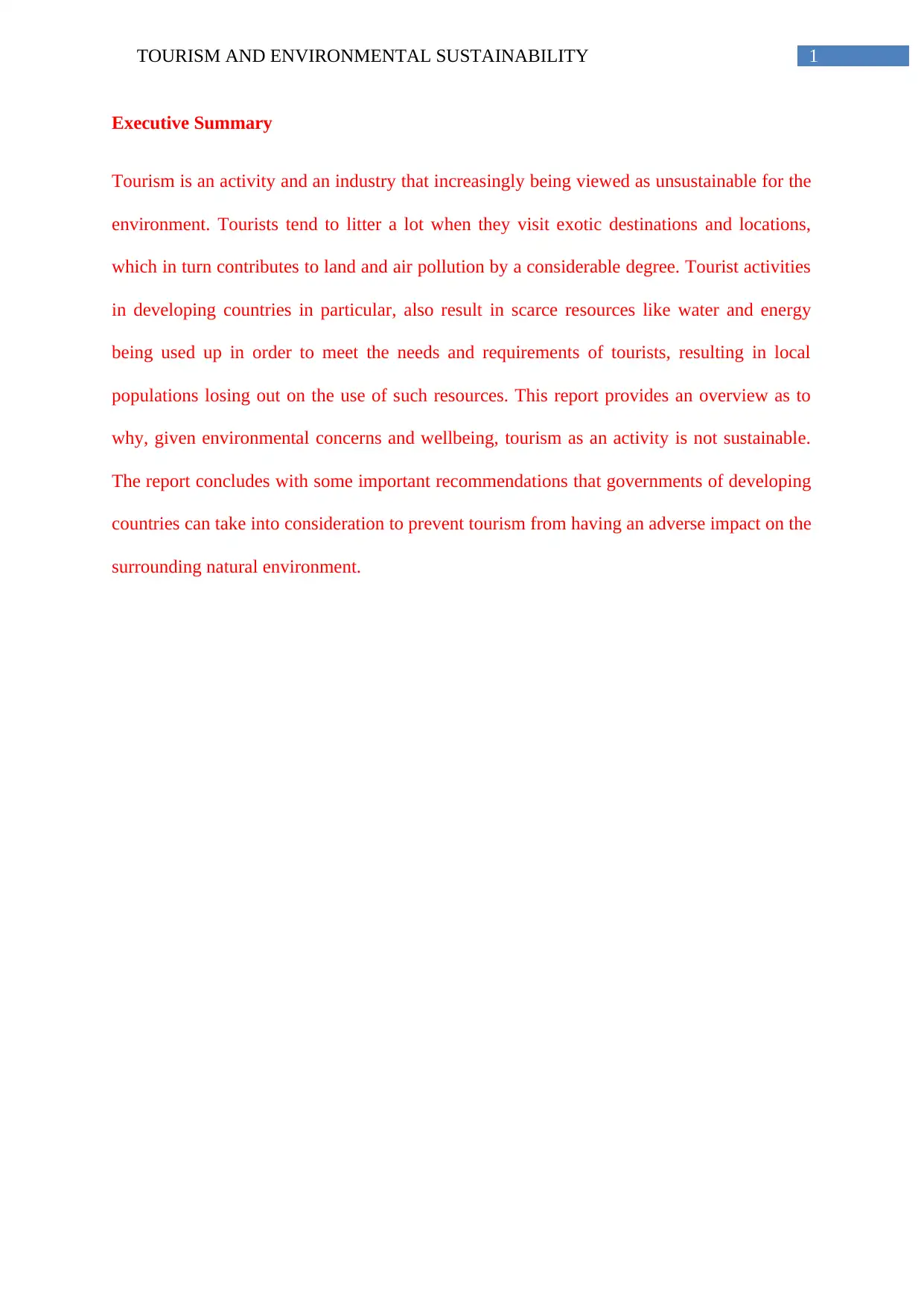
1TOURISM AND ENVIRONMENTAL SUSTAINABILITY
Executive Summary
Tourism is an activity and an industry that increasingly being viewed as unsustainable for the
environment. Tourists tend to litter a lot when they visit exotic destinations and locations,
which in turn contributes to land and air pollution by a considerable degree. Tourist activities
in developing countries in particular, also result in scarce resources like water and energy
being used up in order to meet the needs and requirements of tourists, resulting in local
populations losing out on the use of such resources. This report provides an overview as to
why, given environmental concerns and wellbeing, tourism as an activity is not sustainable.
The report concludes with some important recommendations that governments of developing
countries can take into consideration to prevent tourism from having an adverse impact on the
surrounding natural environment.
Executive Summary
Tourism is an activity and an industry that increasingly being viewed as unsustainable for the
environment. Tourists tend to litter a lot when they visit exotic destinations and locations,
which in turn contributes to land and air pollution by a considerable degree. Tourist activities
in developing countries in particular, also result in scarce resources like water and energy
being used up in order to meet the needs and requirements of tourists, resulting in local
populations losing out on the use of such resources. This report provides an overview as to
why, given environmental concerns and wellbeing, tourism as an activity is not sustainable.
The report concludes with some important recommendations that governments of developing
countries can take into consideration to prevent tourism from having an adverse impact on the
surrounding natural environment.
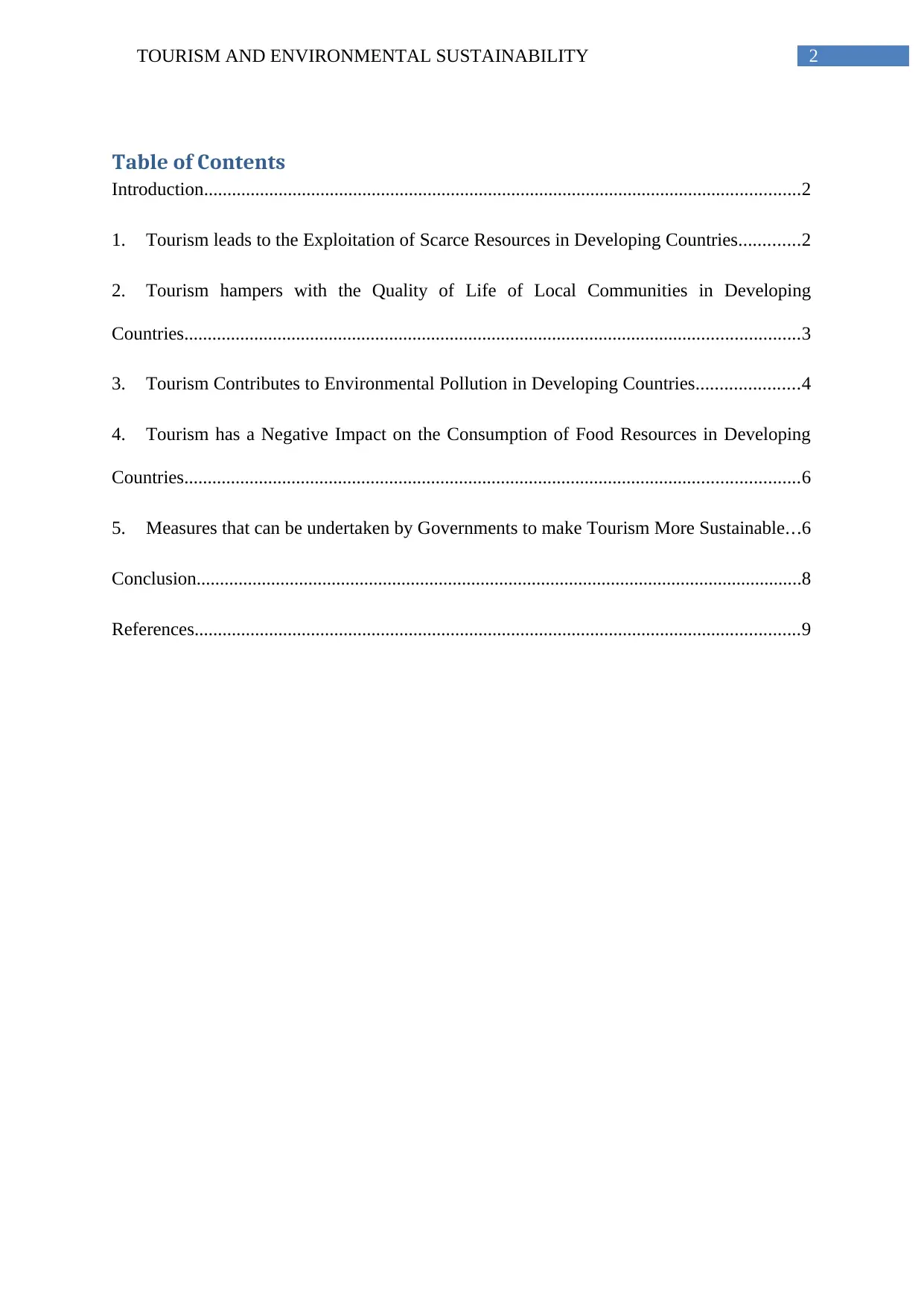
2TOURISM AND ENVIRONMENTAL SUSTAINABILITY
Table of Contents
Introduction................................................................................................................................2
1. Tourism leads to the Exploitation of Scarce Resources in Developing Countries.............2
2. Tourism hampers with the Quality of Life of Local Communities in Developing
Countries....................................................................................................................................3
3. Tourism Contributes to Environmental Pollution in Developing Countries......................4
4. Tourism has a Negative Impact on the Consumption of Food Resources in Developing
Countries....................................................................................................................................6
5. Measures that can be undertaken by Governments to make Tourism More Sustainable...6
Conclusion..................................................................................................................................8
References..................................................................................................................................9
Table of Contents
Introduction................................................................................................................................2
1. Tourism leads to the Exploitation of Scarce Resources in Developing Countries.............2
2. Tourism hampers with the Quality of Life of Local Communities in Developing
Countries....................................................................................................................................3
3. Tourism Contributes to Environmental Pollution in Developing Countries......................4
4. Tourism has a Negative Impact on the Consumption of Food Resources in Developing
Countries....................................................................................................................................6
5. Measures that can be undertaken by Governments to make Tourism More Sustainable...6
Conclusion..................................................................................................................................8
References..................................................................................................................................9
⊘ This is a preview!⊘
Do you want full access?
Subscribe today to unlock all pages.

Trusted by 1+ million students worldwide
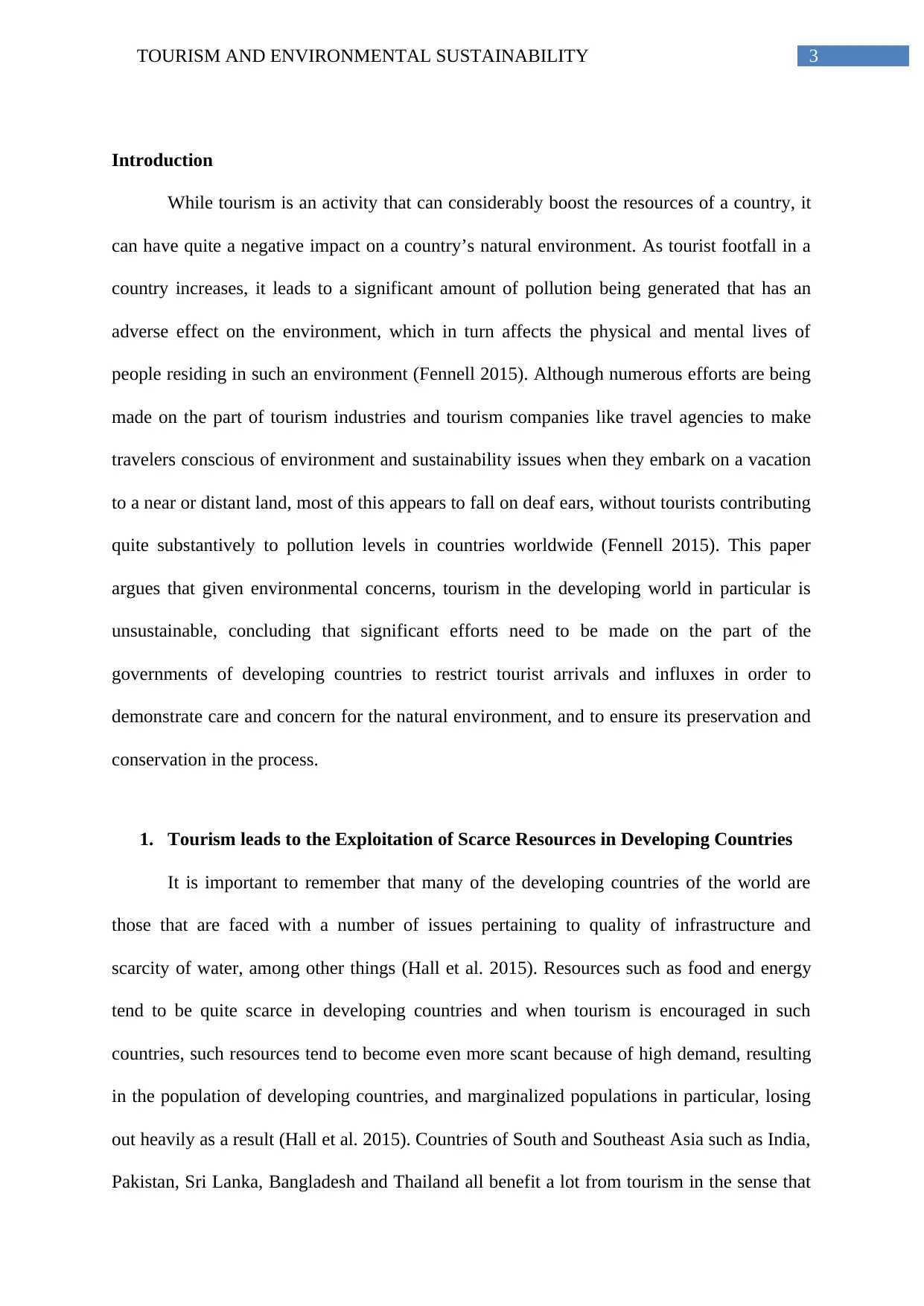
3TOURISM AND ENVIRONMENTAL SUSTAINABILITY
Introduction
While tourism is an activity that can considerably boost the resources of a country, it
can have quite a negative impact on a country’s natural environment. As tourist footfall in a
country increases, it leads to a significant amount of pollution being generated that has an
adverse effect on the environment, which in turn affects the physical and mental lives of
people residing in such an environment (Fennell 2015). Although numerous efforts are being
made on the part of tourism industries and tourism companies like travel agencies to make
travelers conscious of environment and sustainability issues when they embark on a vacation
to a near or distant land, most of this appears to fall on deaf ears, without tourists contributing
quite substantively to pollution levels in countries worldwide (Fennell 2015). This paper
argues that given environmental concerns, tourism in the developing world in particular is
unsustainable, concluding that significant efforts need to be made on the part of the
governments of developing countries to restrict tourist arrivals and influxes in order to
demonstrate care and concern for the natural environment, and to ensure its preservation and
conservation in the process.
1. Tourism leads to the Exploitation of Scarce Resources in Developing Countries
It is important to remember that many of the developing countries of the world are
those that are faced with a number of issues pertaining to quality of infrastructure and
scarcity of water, among other things (Hall et al. 2015). Resources such as food and energy
tend to be quite scarce in developing countries and when tourism is encouraged in such
countries, such resources tend to become even more scant because of high demand, resulting
in the population of developing countries, and marginalized populations in particular, losing
out heavily as a result (Hall et al. 2015). Countries of South and Southeast Asia such as India,
Pakistan, Sri Lanka, Bangladesh and Thailand all benefit a lot from tourism in the sense that
Introduction
While tourism is an activity that can considerably boost the resources of a country, it
can have quite a negative impact on a country’s natural environment. As tourist footfall in a
country increases, it leads to a significant amount of pollution being generated that has an
adverse effect on the environment, which in turn affects the physical and mental lives of
people residing in such an environment (Fennell 2015). Although numerous efforts are being
made on the part of tourism industries and tourism companies like travel agencies to make
travelers conscious of environment and sustainability issues when they embark on a vacation
to a near or distant land, most of this appears to fall on deaf ears, without tourists contributing
quite substantively to pollution levels in countries worldwide (Fennell 2015). This paper
argues that given environmental concerns, tourism in the developing world in particular is
unsustainable, concluding that significant efforts need to be made on the part of the
governments of developing countries to restrict tourist arrivals and influxes in order to
demonstrate care and concern for the natural environment, and to ensure its preservation and
conservation in the process.
1. Tourism leads to the Exploitation of Scarce Resources in Developing Countries
It is important to remember that many of the developing countries of the world are
those that are faced with a number of issues pertaining to quality of infrastructure and
scarcity of water, among other things (Hall et al. 2015). Resources such as food and energy
tend to be quite scarce in developing countries and when tourism is encouraged in such
countries, such resources tend to become even more scant because of high demand, resulting
in the population of developing countries, and marginalized populations in particular, losing
out heavily as a result (Hall et al. 2015). Countries of South and Southeast Asia such as India,
Pakistan, Sri Lanka, Bangladesh and Thailand all benefit a lot from tourism in the sense that
Paraphrase This Document
Need a fresh take? Get an instant paraphrase of this document with our AI Paraphraser
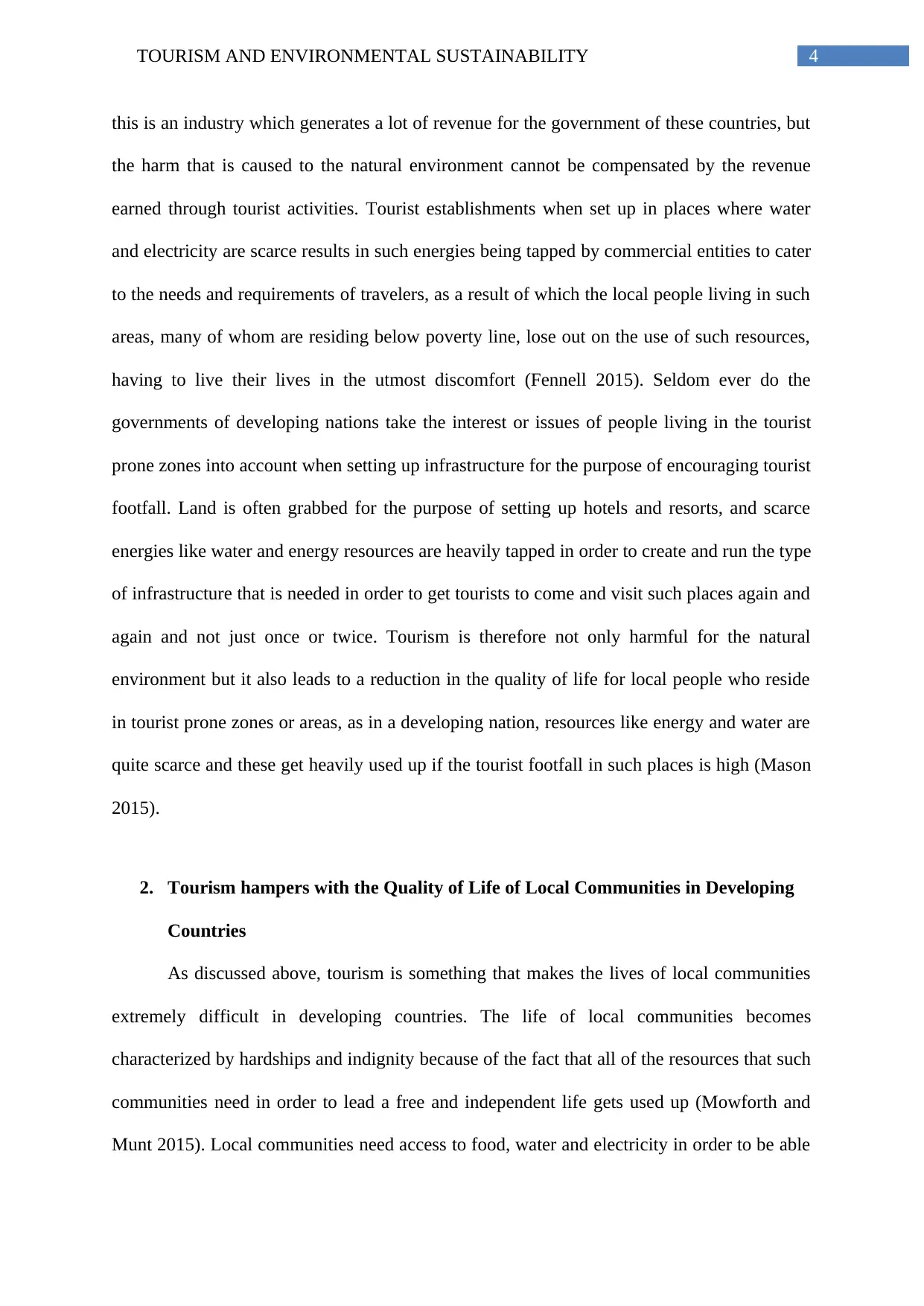
4TOURISM AND ENVIRONMENTAL SUSTAINABILITY
this is an industry which generates a lot of revenue for the government of these countries, but
the harm that is caused to the natural environment cannot be compensated by the revenue
earned through tourist activities. Tourist establishments when set up in places where water
and electricity are scarce results in such energies being tapped by commercial entities to cater
to the needs and requirements of travelers, as a result of which the local people living in such
areas, many of whom are residing below poverty line, lose out on the use of such resources,
having to live their lives in the utmost discomfort (Fennell 2015). Seldom ever do the
governments of developing nations take the interest or issues of people living in the tourist
prone zones into account when setting up infrastructure for the purpose of encouraging tourist
footfall. Land is often grabbed for the purpose of setting up hotels and resorts, and scarce
energies like water and energy resources are heavily tapped in order to create and run the type
of infrastructure that is needed in order to get tourists to come and visit such places again and
again and not just once or twice. Tourism is therefore not only harmful for the natural
environment but it also leads to a reduction in the quality of life for local people who reside
in tourist prone zones or areas, as in a developing nation, resources like energy and water are
quite scarce and these get heavily used up if the tourist footfall in such places is high (Mason
2015).
2. Tourism hampers with the Quality of Life of Local Communities in Developing
Countries
As discussed above, tourism is something that makes the lives of local communities
extremely difficult in developing countries. The life of local communities becomes
characterized by hardships and indignity because of the fact that all of the resources that such
communities need in order to lead a free and independent life gets used up (Mowforth and
Munt 2015). Local communities need access to food, water and electricity in order to be able
this is an industry which generates a lot of revenue for the government of these countries, but
the harm that is caused to the natural environment cannot be compensated by the revenue
earned through tourist activities. Tourist establishments when set up in places where water
and electricity are scarce results in such energies being tapped by commercial entities to cater
to the needs and requirements of travelers, as a result of which the local people living in such
areas, many of whom are residing below poverty line, lose out on the use of such resources,
having to live their lives in the utmost discomfort (Fennell 2015). Seldom ever do the
governments of developing nations take the interest or issues of people living in the tourist
prone zones into account when setting up infrastructure for the purpose of encouraging tourist
footfall. Land is often grabbed for the purpose of setting up hotels and resorts, and scarce
energies like water and energy resources are heavily tapped in order to create and run the type
of infrastructure that is needed in order to get tourists to come and visit such places again and
again and not just once or twice. Tourism is therefore not only harmful for the natural
environment but it also leads to a reduction in the quality of life for local people who reside
in tourist prone zones or areas, as in a developing nation, resources like energy and water are
quite scarce and these get heavily used up if the tourist footfall in such places is high (Mason
2015).
2. Tourism hampers with the Quality of Life of Local Communities in Developing
Countries
As discussed above, tourism is something that makes the lives of local communities
extremely difficult in developing countries. The life of local communities becomes
characterized by hardships and indignity because of the fact that all of the resources that such
communities need in order to lead a free and independent life gets used up (Mowforth and
Munt 2015). Local communities need access to food, water and electricity in order to be able
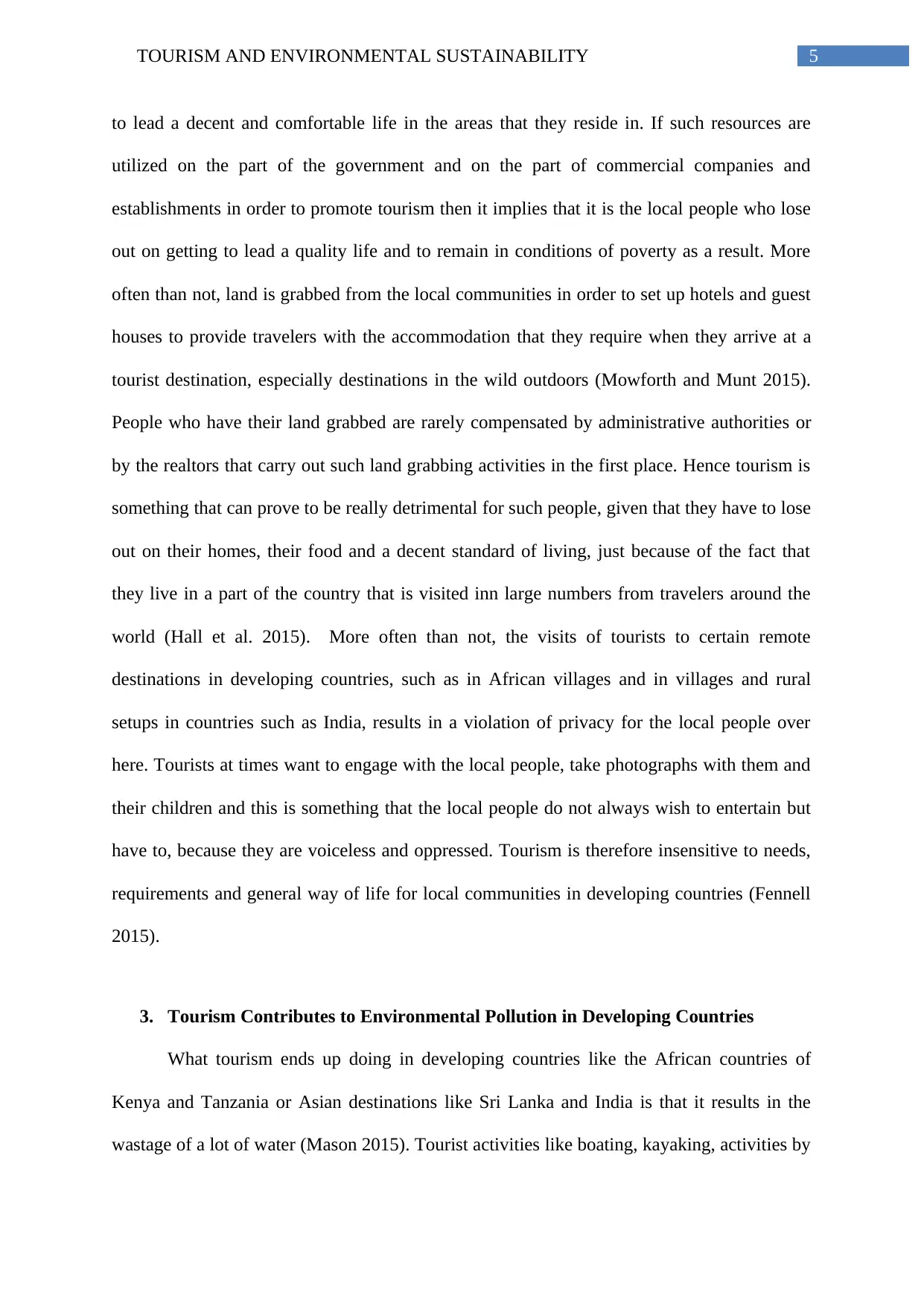
5TOURISM AND ENVIRONMENTAL SUSTAINABILITY
to lead a decent and comfortable life in the areas that they reside in. If such resources are
utilized on the part of the government and on the part of commercial companies and
establishments in order to promote tourism then it implies that it is the local people who lose
out on getting to lead a quality life and to remain in conditions of poverty as a result. More
often than not, land is grabbed from the local communities in order to set up hotels and guest
houses to provide travelers with the accommodation that they require when they arrive at a
tourist destination, especially destinations in the wild outdoors (Mowforth and Munt 2015).
People who have their land grabbed are rarely compensated by administrative authorities or
by the realtors that carry out such land grabbing activities in the first place. Hence tourism is
something that can prove to be really detrimental for such people, given that they have to lose
out on their homes, their food and a decent standard of living, just because of the fact that
they live in a part of the country that is visited inn large numbers from travelers around the
world (Hall et al. 2015). More often than not, the visits of tourists to certain remote
destinations in developing countries, such as in African villages and in villages and rural
setups in countries such as India, results in a violation of privacy for the local people over
here. Tourists at times want to engage with the local people, take photographs with them and
their children and this is something that the local people do not always wish to entertain but
have to, because they are voiceless and oppressed. Tourism is therefore insensitive to needs,
requirements and general way of life for local communities in developing countries (Fennell
2015).
3. Tourism Contributes to Environmental Pollution in Developing Countries
What tourism ends up doing in developing countries like the African countries of
Kenya and Tanzania or Asian destinations like Sri Lanka and India is that it results in the
wastage of a lot of water (Mason 2015). Tourist activities like boating, kayaking, activities by
to lead a decent and comfortable life in the areas that they reside in. If such resources are
utilized on the part of the government and on the part of commercial companies and
establishments in order to promote tourism then it implies that it is the local people who lose
out on getting to lead a quality life and to remain in conditions of poverty as a result. More
often than not, land is grabbed from the local communities in order to set up hotels and guest
houses to provide travelers with the accommodation that they require when they arrive at a
tourist destination, especially destinations in the wild outdoors (Mowforth and Munt 2015).
People who have their land grabbed are rarely compensated by administrative authorities or
by the realtors that carry out such land grabbing activities in the first place. Hence tourism is
something that can prove to be really detrimental for such people, given that they have to lose
out on their homes, their food and a decent standard of living, just because of the fact that
they live in a part of the country that is visited inn large numbers from travelers around the
world (Hall et al. 2015). More often than not, the visits of tourists to certain remote
destinations in developing countries, such as in African villages and in villages and rural
setups in countries such as India, results in a violation of privacy for the local people over
here. Tourists at times want to engage with the local people, take photographs with them and
their children and this is something that the local people do not always wish to entertain but
have to, because they are voiceless and oppressed. Tourism is therefore insensitive to needs,
requirements and general way of life for local communities in developing countries (Fennell
2015).
3. Tourism Contributes to Environmental Pollution in Developing Countries
What tourism ends up doing in developing countries like the African countries of
Kenya and Tanzania or Asian destinations like Sri Lanka and India is that it results in the
wastage of a lot of water (Mason 2015). Tourist activities like boating, kayaking, activities by
⊘ This is a preview!⊘
Do you want full access?
Subscribe today to unlock all pages.

Trusted by 1+ million students worldwide
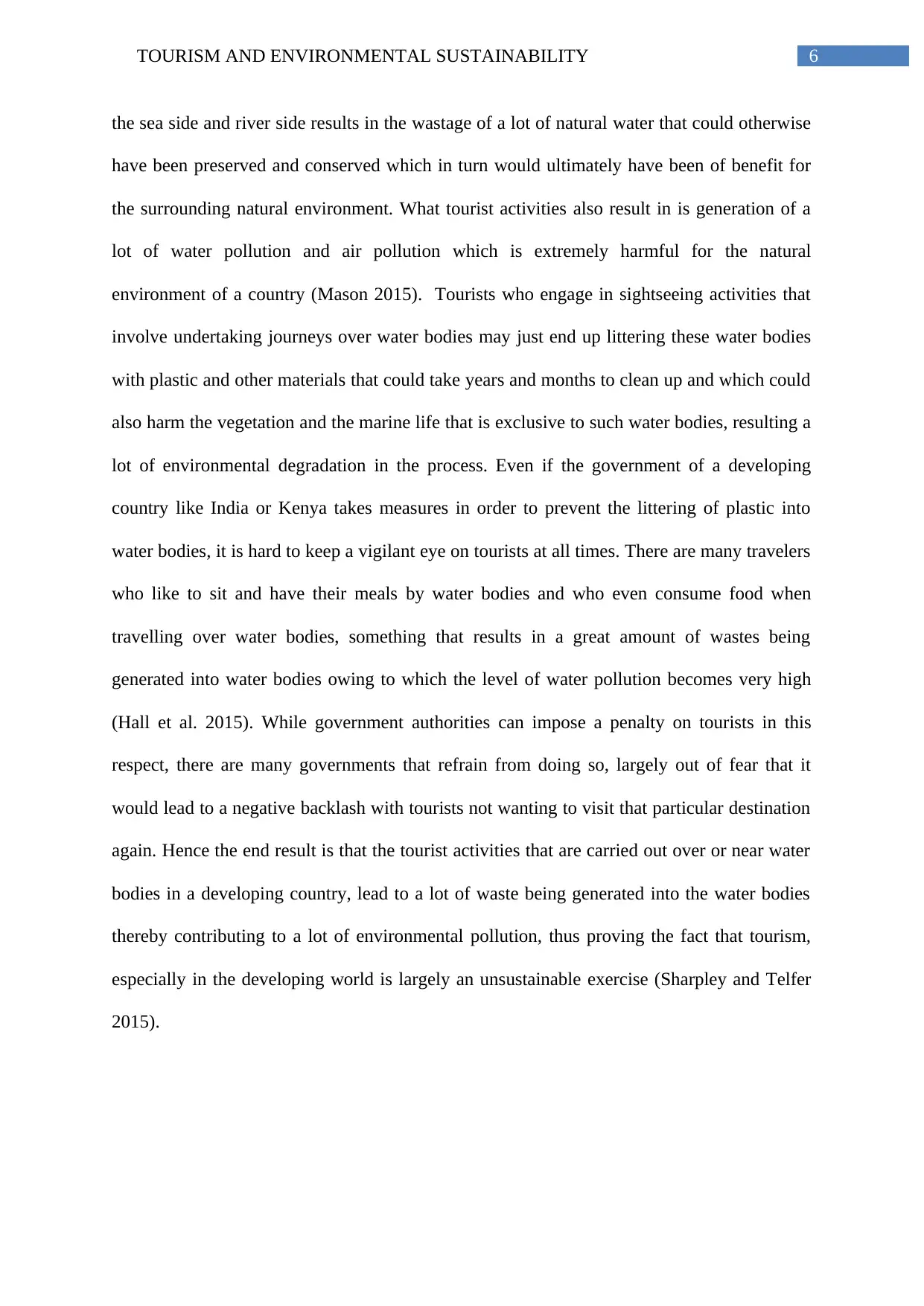
6TOURISM AND ENVIRONMENTAL SUSTAINABILITY
the sea side and river side results in the wastage of a lot of natural water that could otherwise
have been preserved and conserved which in turn would ultimately have been of benefit for
the surrounding natural environment. What tourist activities also result in is generation of a
lot of water pollution and air pollution which is extremely harmful for the natural
environment of a country (Mason 2015). Tourists who engage in sightseeing activities that
involve undertaking journeys over water bodies may just end up littering these water bodies
with plastic and other materials that could take years and months to clean up and which could
also harm the vegetation and the marine life that is exclusive to such water bodies, resulting a
lot of environmental degradation in the process. Even if the government of a developing
country like India or Kenya takes measures in order to prevent the littering of plastic into
water bodies, it is hard to keep a vigilant eye on tourists at all times. There are many travelers
who like to sit and have their meals by water bodies and who even consume food when
travelling over water bodies, something that results in a great amount of wastes being
generated into water bodies owing to which the level of water pollution becomes very high
(Hall et al. 2015). While government authorities can impose a penalty on tourists in this
respect, there are many governments that refrain from doing so, largely out of fear that it
would lead to a negative backlash with tourists not wanting to visit that particular destination
again. Hence the end result is that the tourist activities that are carried out over or near water
bodies in a developing country, lead to a lot of waste being generated into the water bodies
thereby contributing to a lot of environmental pollution, thus proving the fact that tourism,
especially in the developing world is largely an unsustainable exercise (Sharpley and Telfer
2015).
the sea side and river side results in the wastage of a lot of natural water that could otherwise
have been preserved and conserved which in turn would ultimately have been of benefit for
the surrounding natural environment. What tourist activities also result in is generation of a
lot of water pollution and air pollution which is extremely harmful for the natural
environment of a country (Mason 2015). Tourists who engage in sightseeing activities that
involve undertaking journeys over water bodies may just end up littering these water bodies
with plastic and other materials that could take years and months to clean up and which could
also harm the vegetation and the marine life that is exclusive to such water bodies, resulting a
lot of environmental degradation in the process. Even if the government of a developing
country like India or Kenya takes measures in order to prevent the littering of plastic into
water bodies, it is hard to keep a vigilant eye on tourists at all times. There are many travelers
who like to sit and have their meals by water bodies and who even consume food when
travelling over water bodies, something that results in a great amount of wastes being
generated into water bodies owing to which the level of water pollution becomes very high
(Hall et al. 2015). While government authorities can impose a penalty on tourists in this
respect, there are many governments that refrain from doing so, largely out of fear that it
would lead to a negative backlash with tourists not wanting to visit that particular destination
again. Hence the end result is that the tourist activities that are carried out over or near water
bodies in a developing country, lead to a lot of waste being generated into the water bodies
thereby contributing to a lot of environmental pollution, thus proving the fact that tourism,
especially in the developing world is largely an unsustainable exercise (Sharpley and Telfer
2015).
Paraphrase This Document
Need a fresh take? Get an instant paraphrase of this document with our AI Paraphraser
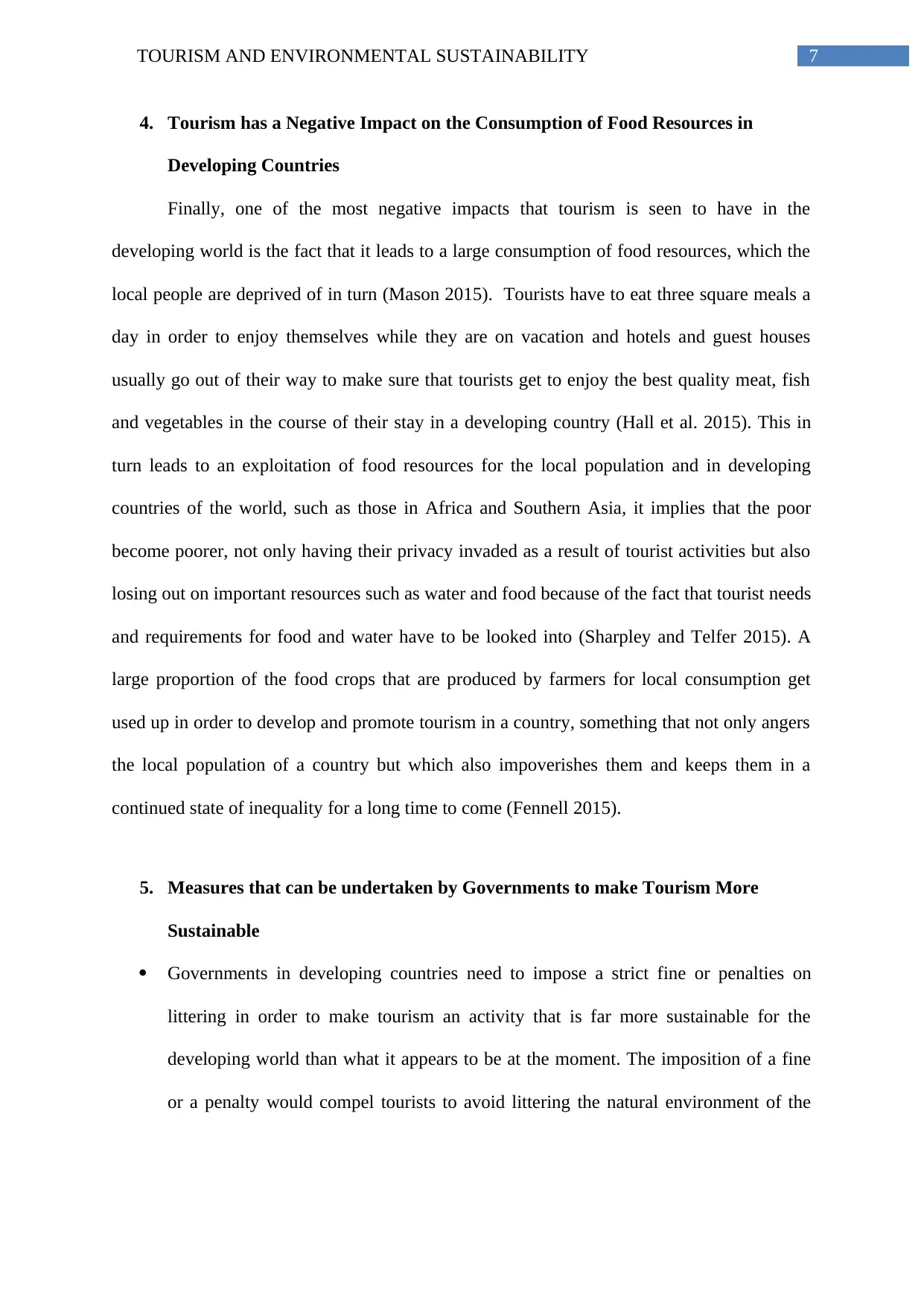
7TOURISM AND ENVIRONMENTAL SUSTAINABILITY
4. Tourism has a Negative Impact on the Consumption of Food Resources in
Developing Countries
Finally, one of the most negative impacts that tourism is seen to have in the
developing world is the fact that it leads to a large consumption of food resources, which the
local people are deprived of in turn (Mason 2015). Tourists have to eat three square meals a
day in order to enjoy themselves while they are on vacation and hotels and guest houses
usually go out of their way to make sure that tourists get to enjoy the best quality meat, fish
and vegetables in the course of their stay in a developing country (Hall et al. 2015). This in
turn leads to an exploitation of food resources for the local population and in developing
countries of the world, such as those in Africa and Southern Asia, it implies that the poor
become poorer, not only having their privacy invaded as a result of tourist activities but also
losing out on important resources such as water and food because of the fact that tourist needs
and requirements for food and water have to be looked into (Sharpley and Telfer 2015). A
large proportion of the food crops that are produced by farmers for local consumption get
used up in order to develop and promote tourism in a country, something that not only angers
the local population of a country but which also impoverishes them and keeps them in a
continued state of inequality for a long time to come (Fennell 2015).
5. Measures that can be undertaken by Governments to make Tourism More
Sustainable
Governments in developing countries need to impose a strict fine or penalties on
littering in order to make tourism an activity that is far more sustainable for the
developing world than what it appears to be at the moment. The imposition of a fine
or a penalty would compel tourists to avoid littering the natural environment of the
4. Tourism has a Negative Impact on the Consumption of Food Resources in
Developing Countries
Finally, one of the most negative impacts that tourism is seen to have in the
developing world is the fact that it leads to a large consumption of food resources, which the
local people are deprived of in turn (Mason 2015). Tourists have to eat three square meals a
day in order to enjoy themselves while they are on vacation and hotels and guest houses
usually go out of their way to make sure that tourists get to enjoy the best quality meat, fish
and vegetables in the course of their stay in a developing country (Hall et al. 2015). This in
turn leads to an exploitation of food resources for the local population and in developing
countries of the world, such as those in Africa and Southern Asia, it implies that the poor
become poorer, not only having their privacy invaded as a result of tourist activities but also
losing out on important resources such as water and food because of the fact that tourist needs
and requirements for food and water have to be looked into (Sharpley and Telfer 2015). A
large proportion of the food crops that are produced by farmers for local consumption get
used up in order to develop and promote tourism in a country, something that not only angers
the local population of a country but which also impoverishes them and keeps them in a
continued state of inequality for a long time to come (Fennell 2015).
5. Measures that can be undertaken by Governments to make Tourism More
Sustainable
Governments in developing countries need to impose a strict fine or penalties on
littering in order to make tourism an activity that is far more sustainable for the
developing world than what it appears to be at the moment. The imposition of a fine
or a penalty would compel tourists to avoid littering the natural environment of the
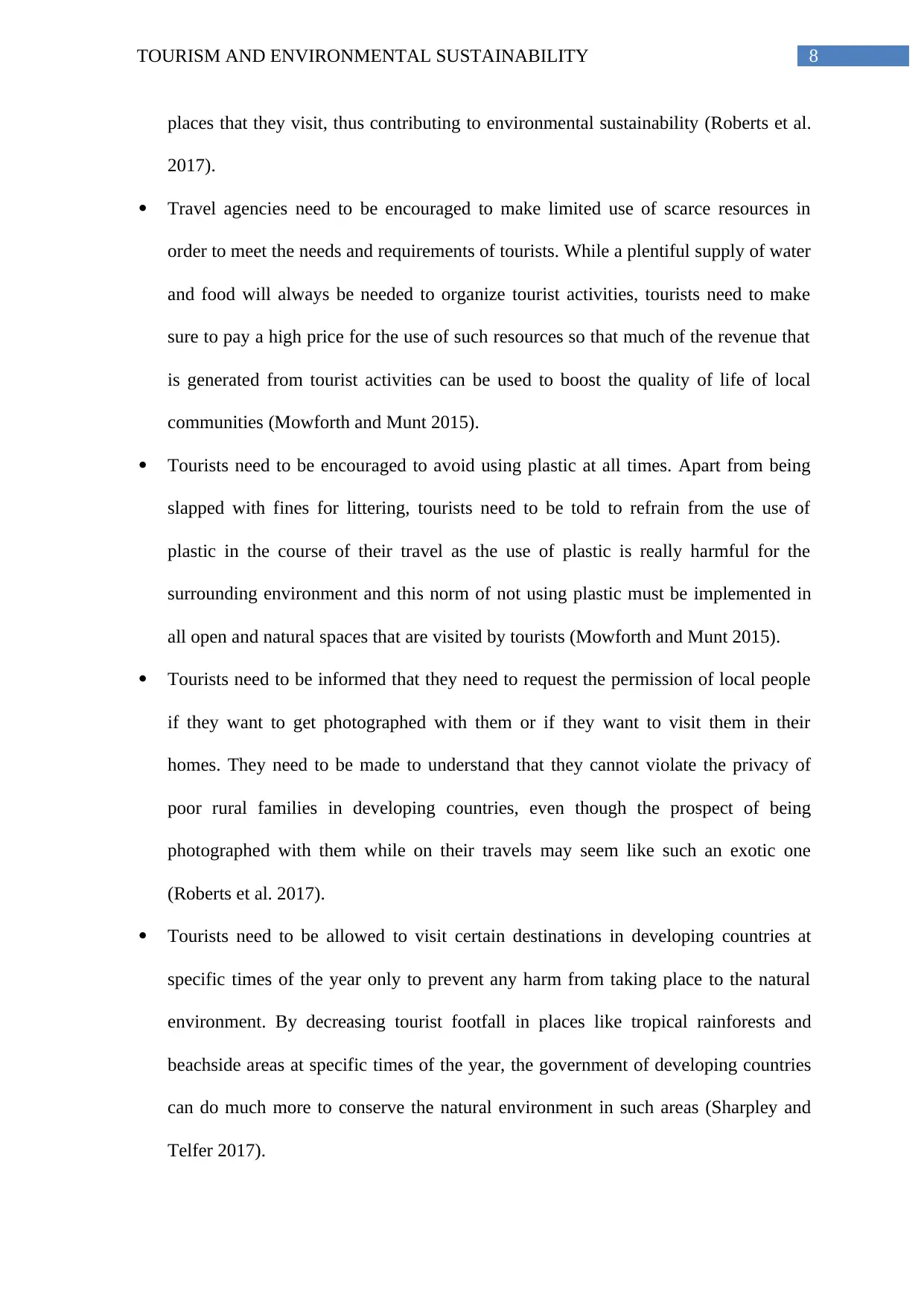
8TOURISM AND ENVIRONMENTAL SUSTAINABILITY
places that they visit, thus contributing to environmental sustainability (Roberts et al.
2017).
Travel agencies need to be encouraged to make limited use of scarce resources in
order to meet the needs and requirements of tourists. While a plentiful supply of water
and food will always be needed to organize tourist activities, tourists need to make
sure to pay a high price for the use of such resources so that much of the revenue that
is generated from tourist activities can be used to boost the quality of life of local
communities (Mowforth and Munt 2015).
Tourists need to be encouraged to avoid using plastic at all times. Apart from being
slapped with fines for littering, tourists need to be told to refrain from the use of
plastic in the course of their travel as the use of plastic is really harmful for the
surrounding environment and this norm of not using plastic must be implemented in
all open and natural spaces that are visited by tourists (Mowforth and Munt 2015).
Tourists need to be informed that they need to request the permission of local people
if they want to get photographed with them or if they want to visit them in their
homes. They need to be made to understand that they cannot violate the privacy of
poor rural families in developing countries, even though the prospect of being
photographed with them while on their travels may seem like such an exotic one
(Roberts et al. 2017).
Tourists need to be allowed to visit certain destinations in developing countries at
specific times of the year only to prevent any harm from taking place to the natural
environment. By decreasing tourist footfall in places like tropical rainforests and
beachside areas at specific times of the year, the government of developing countries
can do much more to conserve the natural environment in such areas (Sharpley and
Telfer 2017).
places that they visit, thus contributing to environmental sustainability (Roberts et al.
2017).
Travel agencies need to be encouraged to make limited use of scarce resources in
order to meet the needs and requirements of tourists. While a plentiful supply of water
and food will always be needed to organize tourist activities, tourists need to make
sure to pay a high price for the use of such resources so that much of the revenue that
is generated from tourist activities can be used to boost the quality of life of local
communities (Mowforth and Munt 2015).
Tourists need to be encouraged to avoid using plastic at all times. Apart from being
slapped with fines for littering, tourists need to be told to refrain from the use of
plastic in the course of their travel as the use of plastic is really harmful for the
surrounding environment and this norm of not using plastic must be implemented in
all open and natural spaces that are visited by tourists (Mowforth and Munt 2015).
Tourists need to be informed that they need to request the permission of local people
if they want to get photographed with them or if they want to visit them in their
homes. They need to be made to understand that they cannot violate the privacy of
poor rural families in developing countries, even though the prospect of being
photographed with them while on their travels may seem like such an exotic one
(Roberts et al. 2017).
Tourists need to be allowed to visit certain destinations in developing countries at
specific times of the year only to prevent any harm from taking place to the natural
environment. By decreasing tourist footfall in places like tropical rainforests and
beachside areas at specific times of the year, the government of developing countries
can do much more to conserve the natural environment in such areas (Sharpley and
Telfer 2017).
⊘ This is a preview!⊘
Do you want full access?
Subscribe today to unlock all pages.

Trusted by 1+ million students worldwide
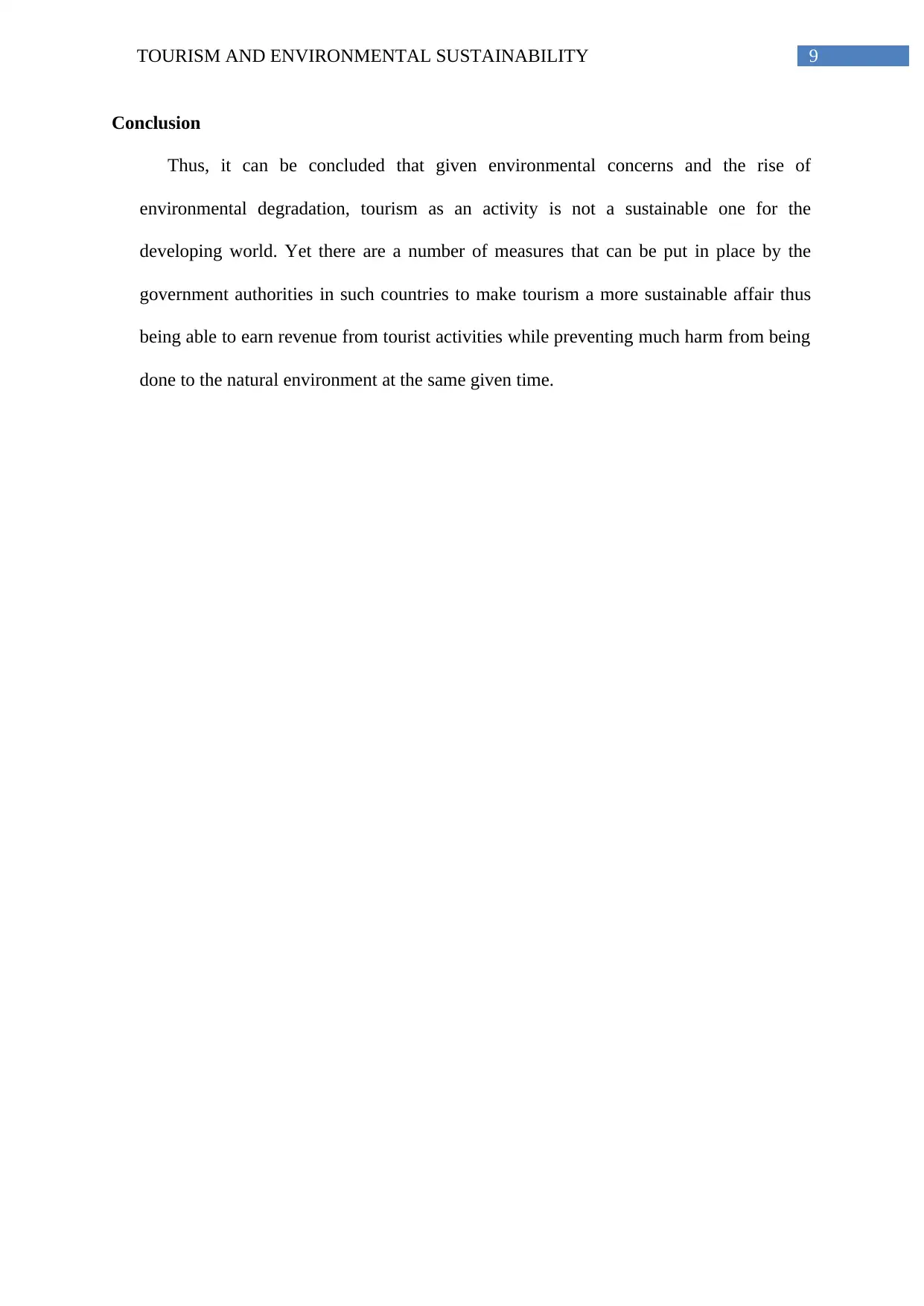
9TOURISM AND ENVIRONMENTAL SUSTAINABILITY
Conclusion
Thus, it can be concluded that given environmental concerns and the rise of
environmental degradation, tourism as an activity is not a sustainable one for the
developing world. Yet there are a number of measures that can be put in place by the
government authorities in such countries to make tourism a more sustainable affair thus
being able to earn revenue from tourist activities while preventing much harm from being
done to the natural environment at the same given time.
Conclusion
Thus, it can be concluded that given environmental concerns and the rise of
environmental degradation, tourism as an activity is not a sustainable one for the
developing world. Yet there are a number of measures that can be put in place by the
government authorities in such countries to make tourism a more sustainable affair thus
being able to earn revenue from tourist activities while preventing much harm from being
done to the natural environment at the same given time.
Paraphrase This Document
Need a fresh take? Get an instant paraphrase of this document with our AI Paraphraser
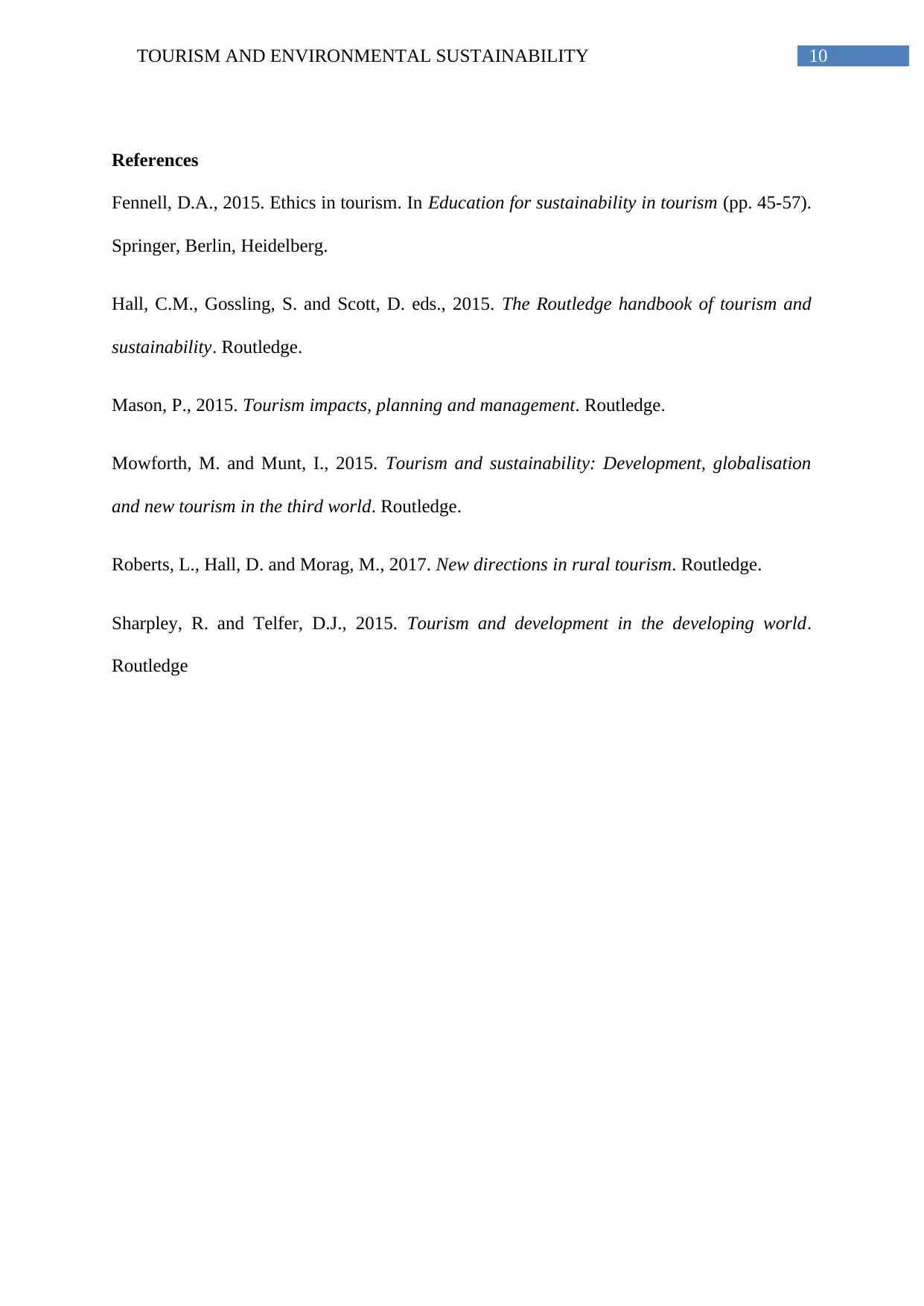
10TOURISM AND ENVIRONMENTAL SUSTAINABILITY
References
Fennell, D.A., 2015. Ethics in tourism. In Education for sustainability in tourism (pp. 45-57).
Springer, Berlin, Heidelberg.
Hall, C.M., Gossling, S. and Scott, D. eds., 2015. The Routledge handbook of tourism and
sustainability. Routledge.
Mason, P., 2015. Tourism impacts, planning and management. Routledge.
Mowforth, M. and Munt, I., 2015. Tourism and sustainability: Development, globalisation
and new tourism in the third world. Routledge.
Roberts, L., Hall, D. and Morag, M., 2017. New directions in rural tourism. Routledge.
Sharpley, R. and Telfer, D.J., 2015. Tourism and development in the developing world.
Routledge
References
Fennell, D.A., 2015. Ethics in tourism. In Education for sustainability in tourism (pp. 45-57).
Springer, Berlin, Heidelberg.
Hall, C.M., Gossling, S. and Scott, D. eds., 2015. The Routledge handbook of tourism and
sustainability. Routledge.
Mason, P., 2015. Tourism impacts, planning and management. Routledge.
Mowforth, M. and Munt, I., 2015. Tourism and sustainability: Development, globalisation
and new tourism in the third world. Routledge.
Roberts, L., Hall, D. and Morag, M., 2017. New directions in rural tourism. Routledge.
Sharpley, R. and Telfer, D.J., 2015. Tourism and development in the developing world.
Routledge
1 out of 11
Related Documents
Your All-in-One AI-Powered Toolkit for Academic Success.
+13062052269
info@desklib.com
Available 24*7 on WhatsApp / Email
![[object Object]](/_next/static/media/star-bottom.7253800d.svg)
Unlock your academic potential
Copyright © 2020–2025 A2Z Services. All Rights Reserved. Developed and managed by ZUCOL.





